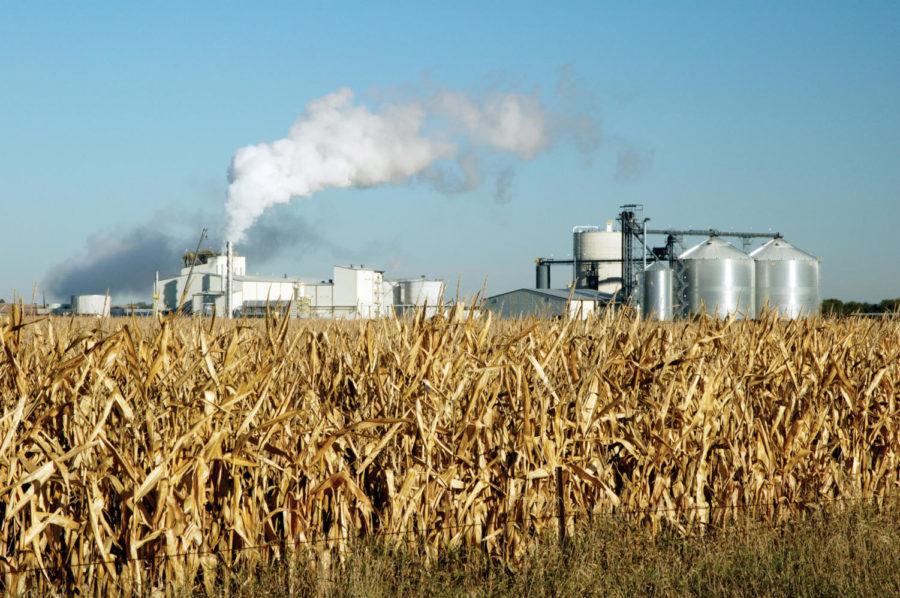Lauver: Ethanol use decreases dependence on foreign energy sources
Opinion: Lauver 10/29
October 28, 2012
In today’s world, stretching one’s dollar and controlling where our money goes might go hand in hand at the gas pump. Ethanol is a valid fuel additive that is more beneficial to this country than meets the eye. Continuing research has confirmed that ethanol, along with other biofuels, is a viable source of energy. Ethanol is cleaner than gasoline, helps with engine performance and creates feed additives for livestock.
What are these positives?
There are numerous positives that ethanol provides, the first that comes to mind is being less harmful to the environment. According to the Renewable Fuels Association, studies have shown ethanol blended with gasoline can reduce carbon monoxide and other toxic emissions by 30 to 50 percent.
Your vehicle’s engine can also benefit from ethanol. By adding just 10 percent ethanol to the fuel blend, the fuel you put in your tank will have two to three points more of octane per gallon over regular gasoline. This helps with engine performance along with the fact that ethanol adds oxygen to the gas making it burn cleaner and emit less harmful fumes.
Ethanol is alcohol-based, so it helps clean the fuel injectors and other important parts of your engine to increase efficiency. Studies have shown 10 percent ethanol and gasoline blend shows only a slight decrease in fuel mileage, only 1 to 2 percent. Ethanol also costs less per mile than regular unleaded gasoline.
There has been a lot of speculation recently as to how much ethanol demand has increased corn prices and in turn has made it harder to raise livestock in general. In the past four years, corn prices have nearly doubled, and in the past two years, corn prices have been linked to the increasing crude oil prices as corn becomes an energy crop. There has been a great deal of pressure from livestock groups due to the current Renewable Fuels Standard. The standard requires 13 billion gallons of ethanol to be used this year and 14 billion gallons of ethanol to be used next year.
The main reason we have seen a rise in corn prices in the past few years is because the crude oil prices have risen, boosting other energy sources as well. This means feed prices for livestock operations will also be higher, but there is another option producers can utilize to reduce feed costs and that is using dried distiller’s grains, a byproduct of ethanol that has nearly the same nutritional value as corn. Ethanol producers claim that almost a third of the corn that is used for ethanol are converted back into feed for livestock in the form of dried distiller’s grains.
Another key point that has to be brought to light is that ethanol is not meant to replace gas altogether. It is meant to supplement our nation’s fuel supply in order to reduce our dependence on foreign oil. This is a concern for all of us as Americans. We must reduce our dependence on foreign oil and begin using sustainable sources of energy.
How does ethanol fuel our Iowa economy?
Ethanol fuels our rural economies by creating jobs in areas that might otherwise lose their ability to attract employers to their area. Many of our small Iowa towns are seeing the average age of citizens increasing into the upper 50s.
We must have economic growth such as ethanol plants to increase the amount of young families that come back to rural Iowa and reinvest in our Iowa economy. When these ethanol plants pop up around the state, they not only create jobs within the plant but also revitalize school systems, health care and service companies. In fact, the American Coalition for Ethanol estimates almost 700 jobs will be created in an area close to an ethanol plant.
With all of these facts, there is ample evidence to say that ethanol is an economical alternative to gasoline. Currently, our Iowa ethanol industry is facing opposition from anti-ethanol advocates asking for the removal of the Renewable Fuels Standard. Moving forward, commodity organizations, farmers and legislators must work together on Capitol Hill to preserve the Renewable Fuels Standard. It is an important component of igniting and maintaining robust rural Iowa economies.







